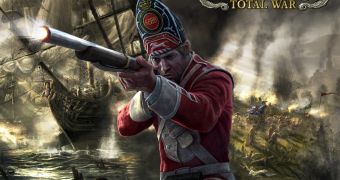I must confess to harboring a deep love for all things related to Total War. From Shogun to Medieval 2 I've played them all, I've suffered until the patches brought out the potential of the games and played some extraordinary mods coming out of the community. So, no game of 2008 (begone, Starcraft II and GTA IV) is more interesting to my gamer soul than Empire: Total War, Creative Assembly's next production.
I took a big, deep breath and read the interview that James Russell, lead designer for the title, gave to IGN. Not surprisingly, there's a lot of information there regarding the game. Apart from the already known facts, like naval battles and a bigger and more interesting world, there are quite a few details that, if implemented correctly, will make Empire a very good game.
Maybe the most gameplay influencing feature is that the team has "taken buildings out of the region capitals and placed them on the map itself, so they are visible at a glance, easily upgradeable straight from the map - and they are individually attackable". In other words the move from board map to free form is now complete. It will be very nice to see how strategies are affected if the player chooses to strangle the farm output of a few grain rich provinces or if someone makes a bee line for the mines that provide one kingdom with money. We'll probably see a whole new layer of strategic possibilities. No longer will grand set piece battles and sieges be the only way to take out an enemy. With individual buildings and resources controlled within a province raids and plunder tactics are really something I look forward to.
For the first time, "we are actually having a technology tree that lets player's research pure technologies as well as construct and upgrade buildings," as Russell says. Depending on what the research process implies (research buildings, monetary investment, specialist citizens, a bit of espionage?) it could prove an important part of the overall strategy in the game. Russell also stops short of saying that there are very different research paths available and, reading between the lines, it seems that you won't be able to research everything in one game.
The inclusion of "diverse government" options also sounds like a winner. The period the game covers, from around 1700 to the early part of the 19th century (I'm guessing 1812, but don't quote me on that) is one in which a lot happens. On the one hand, you have the English parliamentarian system and the French revolution, on the other, the absolutist monarchies of Central Europe and the despotism of Russia. A comprehensive political system, coupled with meaningful diplomacy choices, could attract some grand strategy players to the franchise.
The game is built on a new engine, different from the one powering Rome and Medieval 2, so it's only natural that the development cycle is taking a little longer. I'm hoping for a late 2008 release date.

 14 DAY TRIAL //
14 DAY TRIAL //